The document discusses key concepts related to sustainable development including:
1. The origins of sustainability in resource management and its adoption by the Brundtland Commission to mean "development that meets the needs of the present without compromising the ability of future generations to meet their own needs."
2. Debates around weak and strong sustainability regarding the substitutability of natural resources with human-made capital.
3. The difference between a welfarist view of sustainability focused on preference satisfaction versus a need-based approach considering basic human needs.
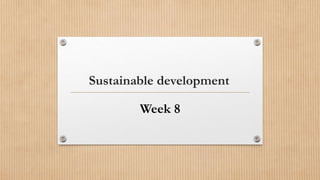
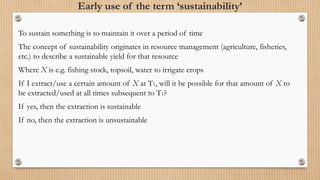
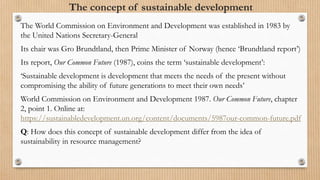
![The concept of sustainable development
[1] ‘Sustainable development is development that meets the needs of the present
without compromising the ability of future generations to meet their own needs’
World Commission on Environment and Development 1987. Our Common Future,
chapter 2, point 1.
[2] Sustainable development is development that ‘use[s] the world’s resources in a way
that is fair to members of future generations’
A. Kernohan 2012. Environmental ethics: an interactive introduction, Ontario: Broadview
Press, p. 308.
Q: How do definitions [1] and [2] differ?](https://image.slidesharecdn.com/week8sustainabledevt-230410071715-b44ea4c4/85/Weekly-SustainableDevt-pptx-4-320.jpg)
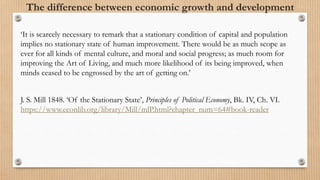
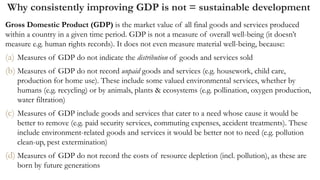
![The Brundtland report (1987)
‘Sustainable development is development that meets the needs of the present without
compromising the ability of future generations to meet their own needs’
(‘Our Common Future’, ch. 2, point 1)
This defines sustainable development in terms of needs
Some needs are more ‘basic’ than others (ch. 2, point 43).
So, their satisfaction should take priority
‘[T]he goals of economic and social development must be defined in terms of
sustainability in all countries’ (‘Our Common Future’, ch. 2, point 2)](https://image.slidesharecdn.com/week8sustainabledevt-230410071715-b44ea4c4/85/Weekly-SustainableDevt-pptx-7-320.jpg)
![What does sustainable development require?
(according to the Brundtland report)
[1] Not to endanger natural systems that support life: the atmosphere, waters, soils, etc.
[2] Not to ‘overexploit’ the world’s resources so that the ability of future generations to meet
their needs is compromised (this is not to say non-renewables may not be used)
[3] Conservation of species
[4] Minimisation of pollution
[5] ‘Demographic developments … in harmony with … changing productive potential’
[6] Changes in the quality of growth to less material-intensive and energy-intensive activities
and improved efficiency
‘The simple duplication in the developing world of industrial countries’ energy use patterns is
neither feasible nor desirable’ (‘Our Common Future’, ch. 2, point 62)
[7] Increasing the domestic market in developing countries](https://image.slidesharecdn.com/week8sustainabledevt-230410071715-b44ea4c4/85/Weekly-SustainableDevt-pptx-8-320.jpg)
![Barriers to sustainable development
[1] Inequalities
(i) which impede the poor from challenging powerful companies who e.g. pollute
(ii) which narrow the poor’s options, making it v. costly for them to live sustainably
[2] State weakness (no secure monopoly on legitimate force in a territory)
Because states are necessary for overcoming assurance problems - by means of taxes,
subsidies, laws, education
[3] Nonalignment of jurisdictions with spaces of impacted environments
E.g. energy policies in one jurisdiction cause acid precipitation in another
This matters, due to the weakness of international cooperation (no world state - see [2])
[4] Limited research incentives in market economies
Commercial organizations aim to produce innovations with market value (in a context of
sectoral fragmentation), rather than public goods](https://image.slidesharecdn.com/week8sustainabledevt-230410071715-b44ea4c4/85/Weekly-SustainableDevt-pptx-9-320.jpg)
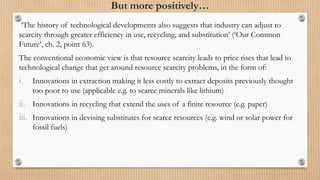
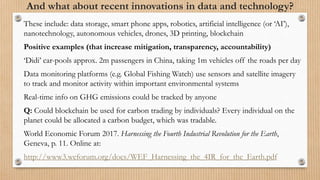
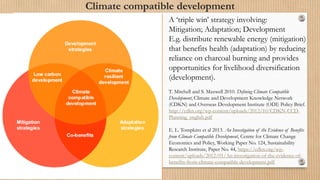
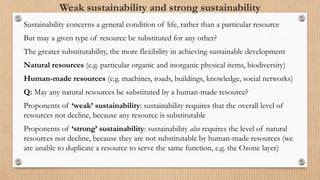
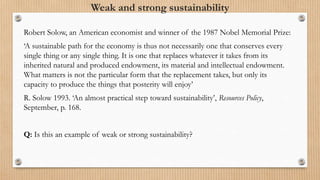
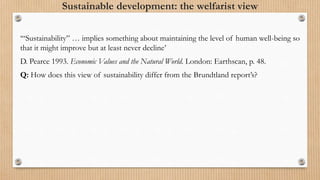
![Needs and preferences
Needs ‘constitute the set of means and ends that constitute a fully functioning human life in a
particular context’
(L. Hamilton 2005. ‘The political philosophy of needs and weak states’ in M. Ayogu and D.
Ross (eds) Development Dilemmas: The Methods and Political Ethics of Growth Policy, p. 177)
Person A has a need for x if x is a means or end in A’s full human functioning
Full human functioning has
[a] a health component, ‘vital needs’: food, clothing, shelter, mobility, rest, entertainment
[b] an agency component, ‘agency needs’: autonomy, intersubjective recognition and active and
creative expression that provide feelings of safety, self-esteem, confidence and courage
(L. Hamilton 2003. The Political Philosophy of Needs, Cambridge: Cambridge University Press)
Preferences, by contrast, reflect a person’s desires at a particular time, and their beliefs.
Preferences are measured by the intensity of desire, or by how much a person is willing to pay](https://image.slidesharecdn.com/week8sustainabledevt-230410071715-b44ea4c4/85/Weekly-SustainableDevt-pptx-16-320.jpg)
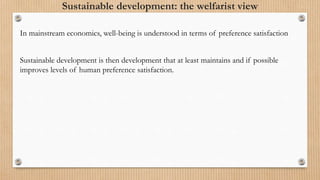
![Two concepts of substitutability
Q: What is meant by saying that one thing is a substitute for another?
We can distinguish two concepts of substitutability
[1] One thing is a technical substitute for another if it realizes the same purpose
E.g. saccharine is a technical substitute for sugar as a sweetener
E.g. wind power is a technical substitute for coal power as a source of energy
[2] One thing is a welfare substitute for another if it realizes the same level of welfare for
an agent (if they are equally preferred)
E.g. beer is a welfare substitute for sweetened tea if the agent is indifferent between beer
and sweetened tea
If we agree that a good that satisfies one need cannot be replaced by a good that satisfies
another need, the different dimensions of need are limits on substitutability](https://image.slidesharecdn.com/week8sustainabledevt-230410071715-b44ea4c4/85/Weekly-SustainableDevt-pptx-18-320.jpg)
![Two concepts of substitutability
Q: What kind of substitutes are these examples of?
[1] Human waste removal technologies as a substitute for a wetland
[2] A new school as a substitute for a wetland
[3] Technologies for increasing the earth’s albedo as a substitute for removing greenhouse
gases from the atmosphere
[4] More programmes on television as a substitute for the loss of birds
[5] Plastic furniture as a substitute for wood furniture](https://image.slidesharecdn.com/week8sustainabledevt-230410071715-b44ea4c4/85/Weekly-SustainableDevt-pptx-19-320.jpg)
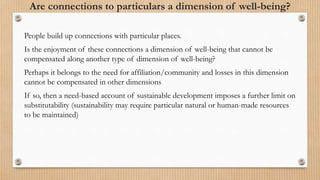
![The choices of future generations
‘[O]ne of the defining characteristics of human beings is their ability to form their own
conceptions of the good life. It would be presumptuous - and unfair - of us to
preempt their choices in the future … What this suggests is that the requirement is to
provide future generations with the opportunity to live good lives according to their
conception of what constitutes a good life. This should surely include their being able
to live good lives according to our conception but should leave other options open to
them.’
(B. Barry 1999. ‘Sustainability and intergenerational justice’, in A. Dobson (ed.) Fairness
and Futurity: Essays on Environmental Sustainability and Social Justice, Oxford: Oxford
University Press, pp. 103-104.)](https://image.slidesharecdn.com/week8sustainabledevt-230410071715-b44ea4c4/85/Weekly-SustainableDevt-pptx-21-320.jpg)
![Class discussion
Read:
[1] J. O’Neill 2017. ‘Sustainability’, in D. Moellendorf and H. Widdows (eds) The Routledge
Handbook of Global Ethics, London: Routledge, pp. 401-415.
and consider:
Q: to what extent do debates over sustainability reflect views on the use of
markets to solve environmental problems?](https://image.slidesharecdn.com/week8sustainabledevt-230410071715-b44ea4c4/85/Weekly-SustainableDevt-pptx-22-320.jpg)